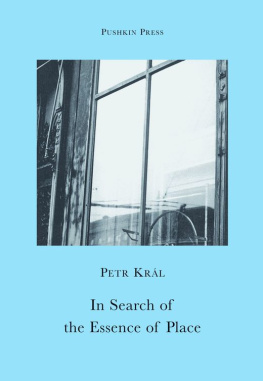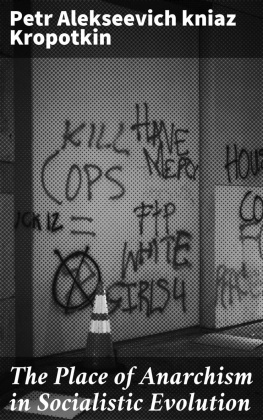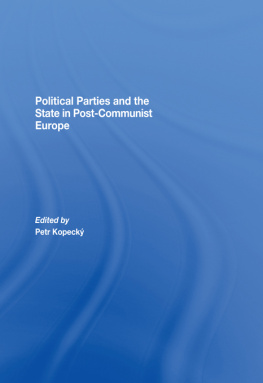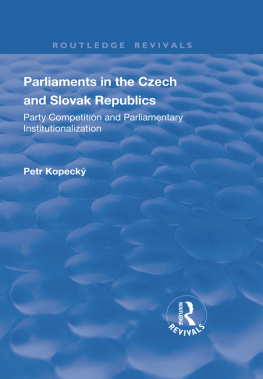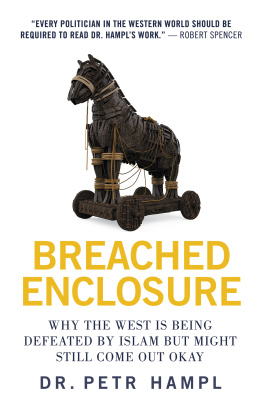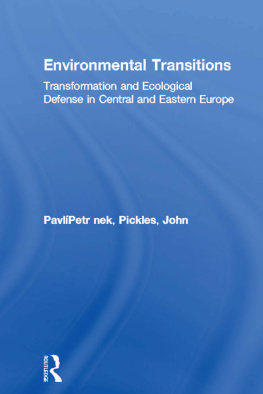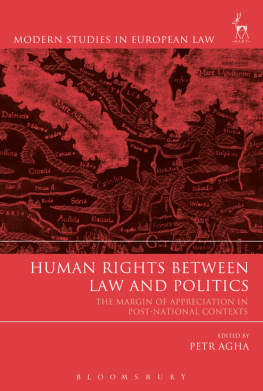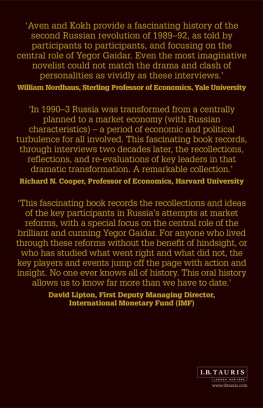Král Petr - In Search of the Essence of Place
Here you can read online Král Petr - In Search of the Essence of Place full text of the book (entire story) in english for free. Download pdf and epub, get meaning, cover and reviews about this ebook. year: 2012, publisher: Pushkin Press, genre: Detective and thriller. Description of the work, (preface) as well as reviews are available. Best literature library LitArk.com created for fans of good reading and offers a wide selection of genres:
Romance novel
Science fiction
Adventure
Detective
Science
History
Home and family
Prose
Art
Politics
Computer
Non-fiction
Religion
Business
Children
Humor
Choose a favorite category and find really read worthwhile books. Enjoy immersion in the world of imagination, feel the emotions of the characters or learn something new for yourself, make an fascinating discovery.
- Book:In Search of the Essence of Place
- Author:
- Publisher:Pushkin Press
- Genre:
- Year:2012
- Rating:3 / 5
- Favourites:Add to favourites
- Your mark:
- 60
- 1
- 2
- 3
- 4
- 5
In Search of the Essence of Place: summary, description and annotation
We offer to read an annotation, description, summary or preface (depends on what the author of the book "In Search of the Essence of Place" wrote himself). If you haven't found the necessary information about the book — write in the comments, we will try to find it.
In Search of the Essence of Place — read online for free the complete book (whole text) full work
Below is the text of the book, divided by pages. System saving the place of the last page read, allows you to conveniently read the book "In Search of the Essence of Place" online for free, without having to search again every time where you left off. Put a bookmark, and you can go to the page where you finished reading at any time.
Font size:
Interval:
Bookmark:
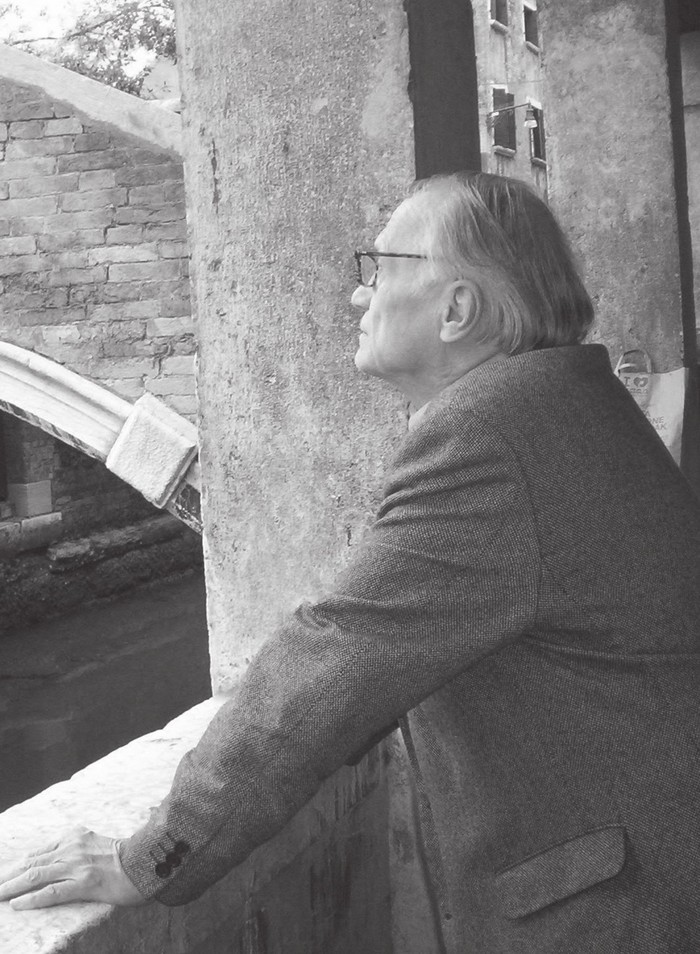
The author and the publishers are grateful to Pierre Clapot for kindly allowing them to use one of his photographs (page 130). All other photographs were taken by the author.
For Ji and Georges-Henri
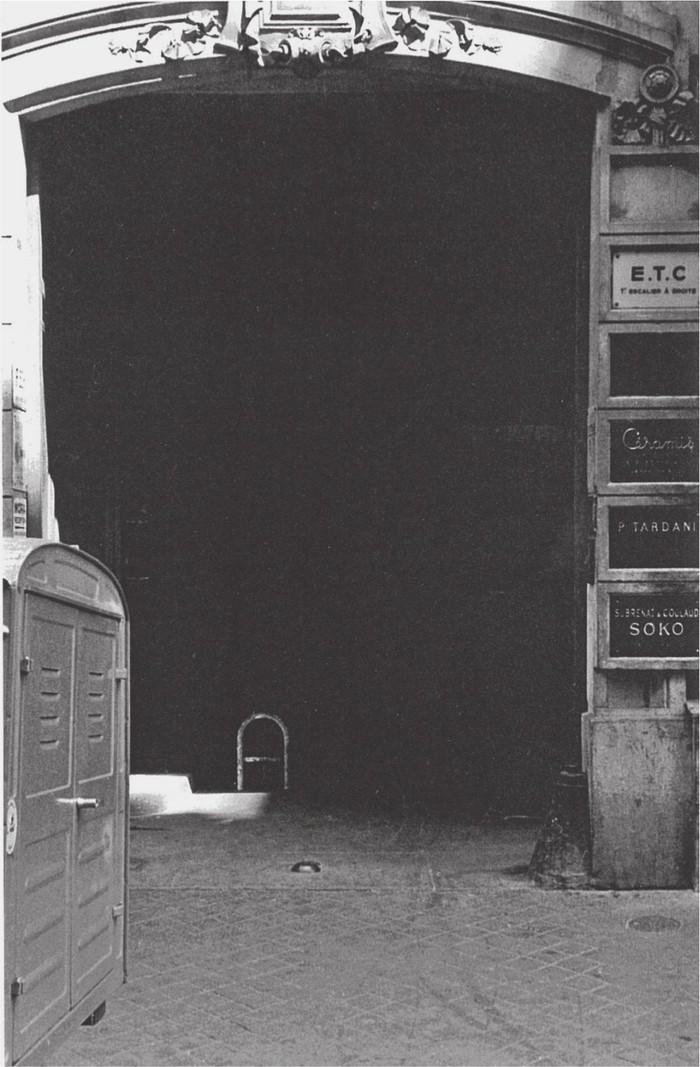
First then we must understand that place would not have been thought of if there had not been a special kind of motion, namely that with respect to place.
Aristotle, Physics, Book IV
(On the essence and definition of place)
L IKE ANY INVESTIGATION , this one begins by noting the presence of an anomaly. One fine sunny morning we come across a (fairly serious) flaw in the tapestry of the world, despite the fact that it is becoming progressively more overcrowded. Although nobody actually says anything, surely we arent the only one to have noticed: in front of us is a stage set, just waiting for the play to start, yet somehow it seems redundant. Nearby houses stand stiff and upright behind their faades, streets and squares sprawl out, almost offering themselves to us, lush greenery shimmers in gardens. Yet all to no avail; no one ever quite goes in, never enters into the conspiracy that the scenery hints is hidden there. So is there no way in?
The result is an appalling surplus of places. They move in, set themselves up, hog the limelight with no intention of leaving; but while they are gaily parading themselves the thread of conspiracy is still there, concealed behind their self-important existence like a broken promise. Only occasionally do we catch what might be another glimpse; the sudden stillness of a far recess, the stark, clinical light of an empty courtyard or the seductive comfort of a block of luxury apartments all seem to give us a knowing wink. All we have to do is accept their invitation and stay there, take up residence in a fitting manner, and we will finally be able to enter the hidden depths, draw near to the mystery of what is really happening. The fact that we are now part of the scenery will itself become the story, perhaps even the solution.
This is the point where we realise there is work to be done. If in the process of drawing up an inventory of these exceptional places we reveal their qualities, this might help us to open up a breach so they can make their voices heard. Secretly hoping, of course, that part of the life of that world will flow out into the one on this sideeven weave a tapestry that will connect the two places Failing that, we might find our ideal refuge, where we can finally stop gasping for breath like a passer-by and relax.
Then we set off again, always keeping our eyes open for places that have potential. Yet are we actually getting anywhere, or are we simply tramping on and on until our footsteps disappear into their own echo? That is the questionor one of them. But like all good stories its probably best to start at the beginning
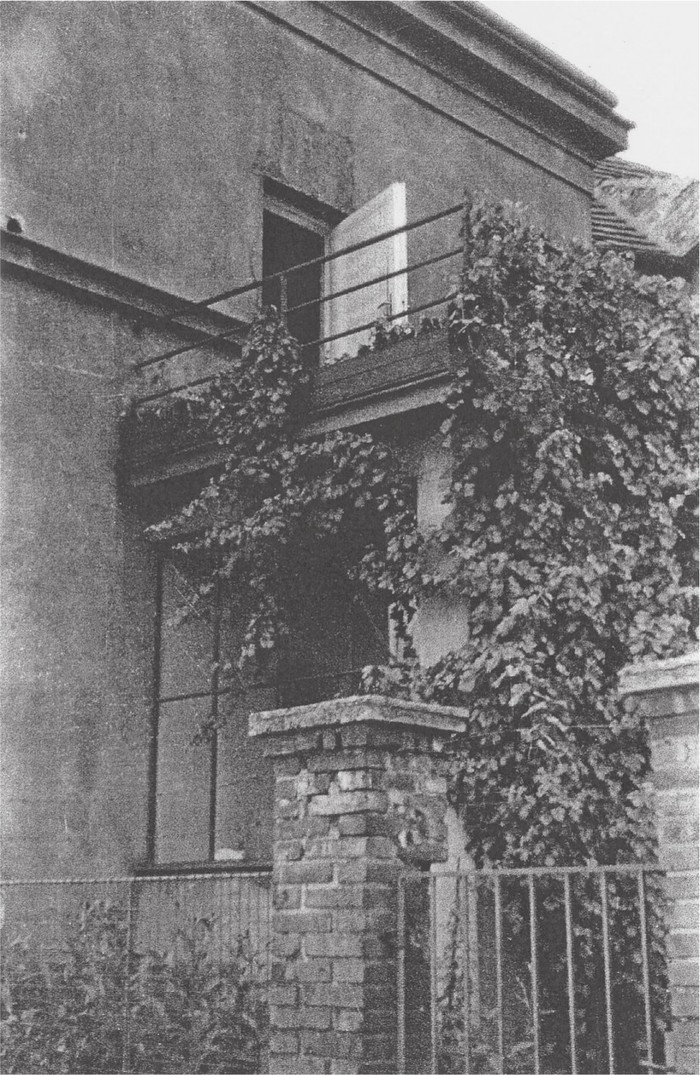
D URING HIS CHILDHOOD , places were simply things that had always been there, unique and permanent facts. In a sense, the thing to do was just learn how to approach them; to win them over and make sure they were looked after. So, while outside the house dozed in the waves of summer sun that beat down on the roughcast plaster walls, he would explore indoors, hoping to find the vital fluids that coursed mysteriously inside the walls.
Upstairs, his curiosity was torn between the attractions of two particular rooms. Mothers boudoir, light and dreamy, brightened by sunlight pouring in through the large windows whose blinds were rarely closed, washing over the collection of white porcelain on a long chest of drawers, while in one corner a figure of Psyche scattered thoughts of loving ardour across the ceiling. The room next door was very masculine: darker and more sober, wood-panelled, at once protective and aloof. A French window led onto a balcony, through starched white curtains that seemed to be woven from spiders webs, the varied weft of their fabric making the night, the moonlight more opaque. To the right of this door a large dark-brown armchair, beside which stood a standard lamp, held sway over the smokers corner. After his father left, this empty throne took the place of the king.
On the endless afternoons when he was mostly left to his own devices, he simply had to nudge open the door and glide into the room, and all of a sudden it was adrift on an ocean of time whose tide of sunlit stillness left a taste of desecration on his lips. Before he could withstand its burning touch he would have to grow, embrace the waves of time that he felt welling up inside him. One day, sinking down between the ample armrests of the chair, he committed his first, furtive sin. Of course, it remained to be seen exactly whose authority he was flouting. In the evening the armchair-throne was occupied by his mother, who sat in it even after the absent fathers role was taken by another man, the doctor.
Yet it was odd how she ignored the armchair in her own boudoir, which was slimmer and more upright, covered in shiny white material that stuck to you like flypaper. There was always a cluster of multicoloured cushions on the seat, a soft barricade that was there to protect it, make it clear that the chair was out of bounds. Yet he would still come in and take the cushions occasionally , although he didnt stay long: he needed them for his dens, the mysterious houses within a house that he was forever building by piling cushions and mattresses in a corner, under the piano or a table. When he had finished he would settle down with the intention of simply being there, like an idle, do-nothing king.
Oddly enough this was just another way of committing sacrilege, overstepping the bounds of good behaviour. It was the same when he hid in the darkened cellar or up in the attic, a vast, pinkish-coloured icebox where ancient chests of drawers, unwanted bookshelves, a lamp without a bulb and a magazine rack made of rattan , faded with age and still full of periodicals with their pages stuck together, stood patiently gathering dust in the stony silence. Like railway carriages shunted into a siding where they gradually take root among the brambles, the discarded items of furniture ended up making the attic a sort of alternative residence: a shabby yet spacious apartment designed for a family of elusive ghosts. This was what made it so intriguing; just as when he was surrounded by cushions in the salon, being on his own among this old furniture pushed the rest of the house into the background and replaced it with this unconquered territory where he alone was lord, although it was too cold to stay there for long. It was a refuge from the familiarity of his home, and protected him from its protection.
He would also strip things of their normal functions. By treating the attic as somewhere to live, the piano or the drawing-room table as an awning, he pushed them to the limits of their use and showed them different ones, like making a walking stick, an umbrella or a sword gush forth water. And although he borrowed the cushions from his mother, as well as trying to turn the house of which she was mistress into a place of inconstancy, he still wanted his hiding places to remind him of the familiar womb.
In the same way he would stare at the next-door houses, especially the one on the left with the concrete path that led to it between two rows of box trees, and which stood behind metal railings and obscure shrubs. Square and flat-roofed, with its unassuming appearance this unfamiliar residence seemed to possess the ill-defined air of distinction that his own home inevitably lacked; its bulky shape rose from the bushes like a beached submarine, the bleary glass of the porthole that it directed towards his garden was an eye issuing a silent challenge. If you wanted to travel the world and have adventures, then the other side of these railings was definitely the place to have been born, wasnt it?
Font size:
Interval:
Bookmark:
Similar books «In Search of the Essence of Place»
Look at similar books to In Search of the Essence of Place. We have selected literature similar in name and meaning in the hope of providing readers with more options to find new, interesting, not yet read works.
Discussion, reviews of the book In Search of the Essence of Place and just readers' own opinions. Leave your comments, write what you think about the work, its meaning or the main characters. Specify what exactly you liked and what you didn't like, and why you think so.

